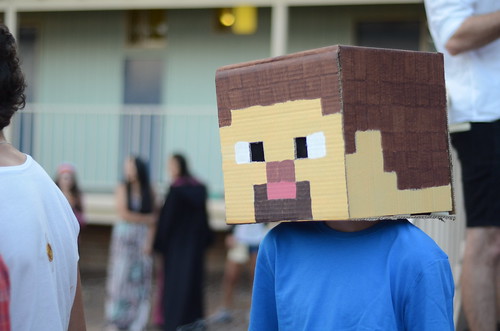Everything I need to know in life I learned at Games in Education 2013
With some serendipity and luck earlier this week, forces aligned for me to attend Games In Education 2013, a multi-day conference focusing on the intersection of games and learning. What helped was that it was being held in my backyard, Malta, NY, at the beautiful HVCC TEC-SMART campus. Additionally, a great slew of sponsors helped make it happen, including Tech Valley High School, Capital Region BOCES, 1st Playable, WMHT, Pastime Legends, and Microsoft. And yes, there was a free lunch in this game.
I was impressed by the well thought out conference program and the amazing volunteers. Whenever I had a question there was someone there to help. Shout out to 1st Playable who had a slew of summer interns helping out, many of which are attending the RIT games and media program. I interacted with a couple of them and they were great.
Here are my Top 6 Life Learning Lessons from Games in Education 2013
1. Walk a mile in anothers’ shoes to understand them. To truly understand someone, you need to experience what they experience. So, to understand our kids, we need to go where kids are to relate to their world. This was stated in Lucas Gillespie’s keynote, and it really struck home for me. This is great advice for teachers, but also for parents. If you are along side your child experiencing it with them, when they get stuck they will turn to you for help. If you aren’t there, you miss out on this opportunity. This leads in perfectly to my next point.
2. Jump in, and don’t be afraid to ask for help. There is no shame in admitting that you are new in a space, and by acknowledging this, you open yourself up to the opportunity of mentorship (even if that mentor is a fifth grader.) As teachers and parents, it’s ok to be vulnerable and let others see that you may not always have the answers. Thanks to Seann Dikkers for helping to make this point. So, the natural next question is where to start. Some suggestions from the Day 1 keynote were Minecraft, Kerbal Space Program, WoW, GuildWars, Portal2, Civilization V, and SimCity4.
3. Learning is about the journey, not the destination. This directly relates to a theme in education that I have been hearing more and more about, BADGES. I’ve heard people talk about “badifying education” and “gamification.” We must not lose sight of the most important thing, the actual learning experience and the opportunities for connecting with others as we learn. Badges are not a golden ticket that will make everything better. If you think badges can make poor educational content palatable to students, think again. Badges on a poorly designed learning experience may make it even worse. Focus on great content and learning activities, and only add badges to make this great content even more fun. Badges will only motivate if used properly, and we can learn a lot about motivation from what has been done in video game research. It’s clear that Kevin Miklasz has done some great thinking about badges and education and is inspiring great science activities at the curiousity machine.
4. Failure is your friend. The idea of failure came up multiple times in the conference. In the first context, it had to do with jumping in to new games. Failing is OK for learning a new environment, in fact, it is healthy and can be a motivator to do better the next time.
We need safe environments for failure for today’s students, where they can have the ability to learn from their mistakes and try again. Customizing learning environments and challenging students in a safe space can allow for new kinds of growth opportunities.
“Fail early, fail often” may be a mantra for rapid learning. So jump in, and don’t be afraid to fail. Learn from it and improve the next time.

5. We live in the most extraordinary time for learning. Be a leader. Lead kids by showing them how to use computers to learn, create, make and play. Not all screentime is bad. When you use a computer to learn how to fix something, program a robot to dance, or create a new video game, you are learning real skills. Teachers can even learn from other teachers! Even social skills can be developed in team-based video games and in using technology for collaboration. It’s not about the screen, but how you use the screen. Teachers and parents need to become aware of amazing resources for inspiring creativity, imagination, and programming. Erynn Petersen shared some of her wisdom as she finds just the right formula for introducing coding to kids in rural America through her project, Station082.
6. Find meaning in what you are doing. While this takeaway stirred some folks at the day 2 keynote, and it resonated with me. If you find personal meaning in what you doing, then you should continue doing it. If you don’t, you might want to consider something else. How much time each day are you spending on things that are meaningful to you? Can you up that percentage tomorrow? Business coach Marshall Goldsmith challenges everyone to help define their own definitions of personal meaning.
Finally, I just wanted to list a few more of the resources that were shared.
Games:
Ingress (Android only)
SimCity for FutureCity Competition
Mission US – History Through Interactive Gaming
Vital NY Resources
GetTheMath
Books:
Ready Player One, Cline
Brain Based Learning, Jensen
Brain Rules, Medina
Ender’s Game
Trailers/Movies:
Ender’s Game (Nov. 2013)
Minority Report
Hardware:
Leap Motion
Oculus
XBox One
NAO Robot
Game Development/Introductory Programming:
Scratch
Kodu
Code Maven and Code Monster
Alice
Radix
What did I miss at Games in Education 2013? Let me know in the comments.





The games mentioned are amazing, but don’t forget those ‘simple’ games. Learning vocabulary is more fun as a crossword puzzle or when trying not to hang from a hangman’s noose! Learning important theories and who wrote them is more fun when turned into a ‘speed dating theorists’ activity. I love to play in my classroom because I have more fun, and my kids have more fun, and their more likely to remember what I’m teaching if they have to do something with it. I sure do love the shiny and new, but don’t toss those blocks on your way to the computer. 🙂
Katrinka,
Those are great points! Let’s not forget that games were hands on before they were ever on a computer. I’ve always loved games and I agree that there did seem to be a lack of traditional “gaming” at this conference, as reflected in my blog post. Great observation. Did you have any favorite games growing up that influenced you?
AC
So cool Alex. I want to hear more about it!